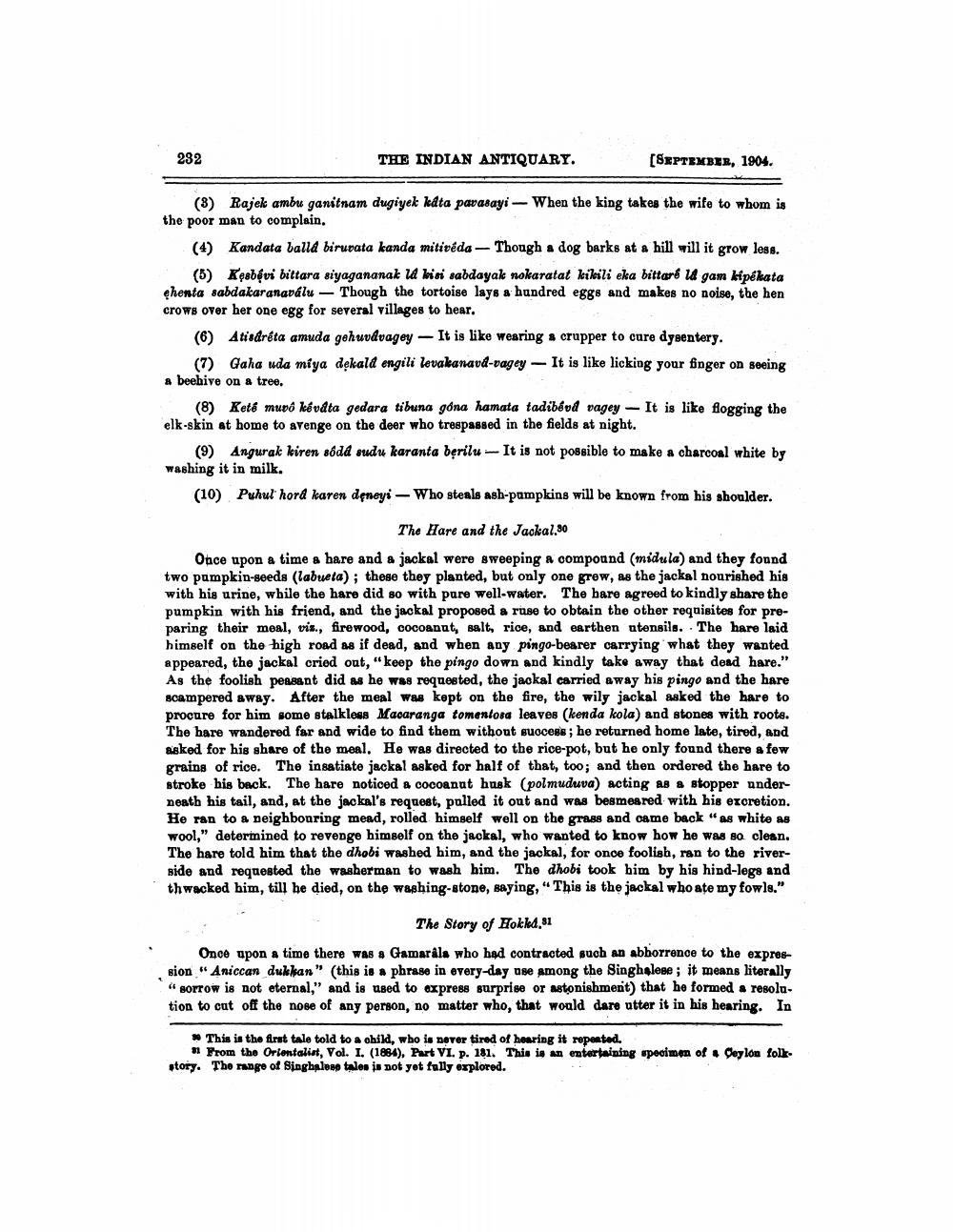________________
232
THE INDIAN ANTIQUARY.
[SEPTEMBER, 1904.
(8) Rajek ambu ganitnam dugiyek kdta pavasayi - When the king takes the wife to whom is the poor man to complain.
(4) Kandata balla biruvata kanda mitivéda - Though a dog barks at a hill will it grow less.
(5) Kesbevi bittara siyagananak ia kisi sabdayak nokaratat kikili eka bittard i gam kipékata ehenta sabdakaranaválu - Though the tortoise lays a hundred eggs and makes no noise, the hen crows over her one egg for several villages to hear.
(6) Atisdréta amuda gehuvdvagey - It is like wearing a crupper to cure dysentery.
(7) Gaha uda miya dekald engili levakanavd-vagey - It is like licking your finger on seeing & beehive on a tree.
(8) Keté mupó kévdta gedara tibuna göna hamata tadibêvd vagey - It is like flogging the elk-skin at home to avenge on the deer who trespassed in the fields at night.
(9) Angurak liren sødd sudu karanta berilu -- It is not possible to make a charcoal white by washing it in milk.
(10) Puhul'hord karen deneyi - Who steals ash-pampkins will be known from his shoulder.
The Hare and the Jackal.80 Once upon a time a hare and a jackal were sweeping a compound (midula) and they found two pumpkin-seeds (labuela); these they planted, but only one grew, as the jackal nourished his with his urine, while the hare did so with pare well-water. The hare agreed to kindly share the pumpkin with his friend, and the jackal proposed a ruse to obtain the other requisites for preparing their meal, vis., firewood, cocoanat, salt, rice, and earthen utensils. The hare laid himself on the high road as if dead, and when any pingo-bearer carrying what they wanted appeared, the jackal cried out, "keep the pingo down and kindly take away that dead hare." As the foolish peasant did as he was requested, the jackal carried away his pingo and the hare scampered away. After the meal was kept on the fire, the wily jackal asked the hare to procure for him some stalkless Macaranga tomentosa leaves (kenda kola) and stones with roots. The hare wandered far and wide to find them without suocess; he returned home late, tired, and asked for his share of the meal. He was directed to the rice-pot, but he only found there a few grains of rice. The insatiate jackal asked for half of that, too; and then ordered the hare to stroke his back. The hare noticed a cocoanat husk (polmuduva) acting as a stopper anderneath his tail, and, at the jackal's request, pulled it out and was besmeared with his excretion. He ran to a neighbouring mead, rolled himself well on the grass and came back "as white as wool," determined to revenge himself on the jackal, who wanted to know how he was so clean. The hare told him that the dhobi washed him, and the jackal, for once foolish, ran to the riverside and requested the washerman to wash him. The dhobi took him by his hind legs and thwacked him, till he died, on the washing-stone, saying, “This is the jackal who ate my fowls."
The Story of Hokk4,81
Once upon a time there was a Gamarála who had contracted such an abhorrence to the expression " Aniccan dukkan" (this is a phrase in every day use among the Singhalese; it means literally "Sorrow is not eternal," and is used to express surprise or astonishment) that he formed a resolution to cat off the nose of any person, no matter who, that would dare utter it in his hearing. In
* This is the first tale told to a child, who is never tired of hearing it repeated.
From the Orientalist, Vol. I. (1884), Part VI. p. 181. This is an entertaining specimen of « Ceylon folk. story. The range of Singhalosp tales is not yet fully explored.




